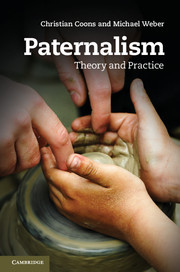Book contents
- Frontmatter
- Contents
- Contributors
- Introduction Paternalism – Issues and trends
- Chapter 1 Defining paternalism
- Chapter 2 Penal paternalism
- Chapter 3 Self-sovereignty and paternalism
- Chapter 4 The right to autonomy and the justification of hard paternalism
- Chapter 5 Moral environmentalism
- Chapter 6 Kantian paternalism and suicide intervention
- Chapter 7 Paternalism and the principle of fairness
- Chapter 8 Paternalism in economics
- Chapter 9 Choice Architecture: A mechanism for improving decisions while preserving liberty?
- Chapter 10 A psychological defense of paternalism
- Chapter 11 Libertarian paternalism, utilitarianism, and justice
- Chapter 12 Voluntary enslavement
- Chapter 13 Paternalism, (school) choice, and opportunity
- Bibliography
- Index
Chapter 2 - Penal paternalism
Published online by Cambridge University Press: 05 February 2013
- Frontmatter
- Contents
- Contributors
- Introduction Paternalism – Issues and trends
- Chapter 1 Defining paternalism
- Chapter 2 Penal paternalism
- Chapter 3 Self-sovereignty and paternalism
- Chapter 4 The right to autonomy and the justification of hard paternalism
- Chapter 5 Moral environmentalism
- Chapter 6 Kantian paternalism and suicide intervention
- Chapter 7 Paternalism and the principle of fairness
- Chapter 8 Paternalism in economics
- Chapter 9 Choice Architecture: A mechanism for improving decisions while preserving liberty?
- Chapter 10 A psychological defense of paternalism
- Chapter 11 Libertarian paternalism, utilitarianism, and justice
- Chapter 12 Voluntary enslavement
- Chapter 13 Paternalism, (school) choice, and opportunity
- Bibliography
- Index
Summary
I propose to discuss the special problems that pertain to penal paternalism. A fair amount of scholarship purports to examine paternalism without specifying the domain to which its views apply. I contend, however, that legal paternalism tends to present special problems to which paternalism in moral philosophy is not subject. Moreover, paternalism in the penal law poses normative challenges not replicated elsewhere in the law. Both friends and foes of paternalism seemingly suppose that arguments about its justification need not be tied to more general theories of criminalization. But I doubt that we should try to say much against or in favor of penal paternalism without an awareness of our commitments about what would count as a good reason to oppose or support any criminal law. I hope to rectify the tendencies I have described by relating thoughts about paternalism to a broader theory of criminalization. More particularly, I will relate thoughts about paternalism to my theory of criminalization – the theory I have defended elsewhere. Even though I believe that paternalistic rationales may be persuasive in many contexts – including those in civil law – they almost never provide good reasons to resort to punitive sanctions. My defense of this position is rather complex and very sensitive to empirical facts – far too complex and sensitive to empirical facts for some of my critics. No simple argument against all paternalism succeeds, even in the criminal domain. If we begin with firm intuitions that all paternalism is objectionable, we are bound to find my subsequent reservations to be too nuanced and qualified. Lacking such intuitions, I conclude that the fate of penal paternalism depends on the outcome of several complex and empirically uncertain determinations.
- Type
- Chapter
- Information
- PaternalismTheory and Practice, pp. 39 - 55Publisher: Cambridge University PressPrint publication year: 2013
- 6
- Cited by

